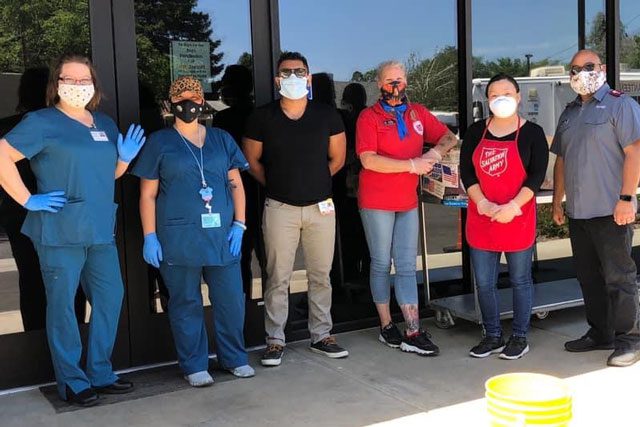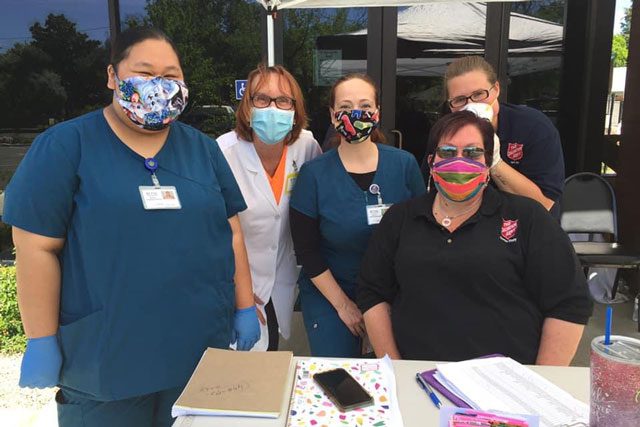Butte College and the Chico Corps form a mutually beneficial alliance.
By Vivian Lopez –
COVID-19 presented Butte College nursing students in Oroville, California, with a dilemma. They had to complete clinical study requirements to advance in their program, but their campus was closed and local hospitals were unable to conduct training as they dealt with coronavirus cases. Without their clinical study finished, the students would have to repeat their entire semester of studies.
When Butte College nursing instructor Shaaron Vogel discovered telehealth counted toward clinical study completion, she reached out to The Salvation Army in Chico, California, with a partnership idea: her class of approximately 70 nursing students would volunteer at the corps, collecting phone numbers from social services clients, so they could then conduct wellness checks with them over the phone.
“They were one of my first calls,” Vogel said. “I was so impressed that literally in hours I got a response.”
Captain Arwyn Rodriguera, Chico Corps Officer, immediately said yes—as her own mother is an emergency room nurse caring for patients during the pandemic.
“At the same time Shaaron was calling me, my mom was actually going into quarantine because she was exposed on the job to COVID-19,” Rodriguera said. “I had these nursing students reaching out, and then in my personal life, I saw a direct need for frontline workers.”
Rodriguera also saw the need for their assistance as many of the corps’ older adults clients were struggling with isolation and mental health under the stay-at-home order.
“In Chico, we’ve experienced disaster after disaster, so going into COVID-19 we’ve seen in the community a need for a sustainable disaster response plan beyond the immediate food box,” Rodriguera said. “For people in isolation to have that additional check-in was a huge blessing for us. It’s not just a food box at a door, but it’s an emotional connection, as well as hours for a nurse who has a 40-year career ahead of them.”
Rodriguera and Vogel worked out a system for three nursing students to assist at the corps daily with COVID-19 food distribution and home deliveries for six weeks. That way each student participated at least once. While volunteering, the future nurses asked clients for their phone numbers and followed up with wellness check phone calls—addressing overall health, pre-existing conditions, medications and mental health—to 10 clients to complete their required 40 hours of telehealth.
“They gave us a level of safety and credibility. It was a huge blessing to our team because we weren’t sure how we were going to have volunteers come in not knowing…what’s safe and what’s not. They already knew about personal protective equipment and proper hygiene,” Rodriguera said. “It’s wraparound services. We serve a vulnerable population and we have the opportunity to partner with people who bring expertise.”

By the end of the six weeks, every student got the hours they needed to move forward in their program, and a little over 600 wellness checks with Salvation Army clients were completed.
“We would not have 70 students going on in our nursing program without The Salvation Army. It was a wonderful experience for our students and we are so grateful,” Vogel said. “There were numerous schools across the state who didn’t get to do that. They literally had to stop the program and have students repeat the semester. We didn’t have that happen because of The Salvation Army. It was heaven-sent.”
At the end of the course, Vogel had her students write essays about their time working at the Chico Corps and she said they made her cry.
“It was amazing,” Vogel said. “They were so touched by their conversations with the clients and were so in awe of all the services The Salvation Army offered and supported for the people in our community. They didn’t realize how many people were suffering and how many services The Salvation Army offered. It was really an eye-opener for them.”
Megan Maginnis, a Butte College nursing student, said it was a big relief to be able to finish her clinical study at the Chico Corps.
“I’m very thankful…that they allowed us to do this, so we were able to move on,” Maginnis said. “Because without them, we wouldn’t have been able to.”
Maginnis noted how appreciative clients were for their wellness calls.
“They enjoyed having someone to talk to and check in on them to see how they were doing through this whole global pandemic,” she said. “It was nice to be able to help out the community through The Salvation Army.”
Rodriguera echoed how much the corps’ clients benefitted from the wellness check-up calls. She recalled that one client was worried she was experiencing signs of a stroke but was too concerned about hospitals being overrun with COVID-19 patients to seek medical care. A student conducting her check-up assured her that was not the case and she was able to get the assistance she needed.
“The students helped us more than we ever felt like we could help them,” Rodriguera said. “They brought]hope that it’s going to be OK and that the next generation is rising up and that reinforcements are coming. That’s a really important message…at times like these.”
HOW TO HELP:
- If you’d like to make a monetary donation, please click here to make a gift.
- Text ‘GIVE’ to 52000 to make a $10 donation to The Salvation Army. This will automatically add a one-time donation to your next mobile phone bill.
- For information about volunteering, please visit volunteer.usawest.org.
- To learn more about how to support The Salvation Army’s relief efforts, please click here.











